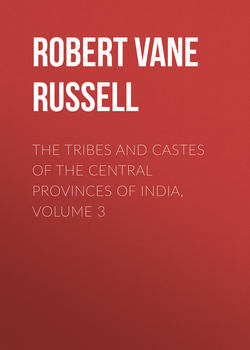Читать книгу The Tribes and Castes of the Central Provinces of India, Volume 3 - Robert Vane Russell - Страница 31
Gond
(b) Tribal Subdivisions
13. Totemism
ОглавлениеMany of the septs are named after animals and plants. Among the commonest septs in all Districts are Markām, the mango tree; Tekām, the teak tree; Netām, the dog; Irpāchi, the mahua tree; Tumrāchi, the tendu tree; Warkara, the wild cat, and so on. Generally the members of a sept do not kill or injure their totem animals, but the rule is not always observed, and in some cases they now have some other object of veneration, possibly because they have forgotten the meaning of the sept name, or the object after which it is named has ceased to be sacred. Thus the Markām sept, though named after the mango, now venerate the tortoise, and this is also the case with the Netām sept in Bastar, though named after the dog. In Bastar a man revering the tortoise, though he will not catch the animal himself, will get one of his friends to catch it, and one revering the goat, if he wishes to kill a goat for a feast, will kill it not at his own house but at a friend’s. The meaning of the important sept names Marābi, Dhurwa and Uika has not been ascertained, and the members of the sept do not know it. In Mandla the Marābi sept are divided into the Eti Marābi and Padi Marābi, named after the goat and pig. The Eti or goat Marābi will not touch a goat nor sacrifice one to Bura Deo. They say that once their ancestors stole a goat and were caught by the owner, when they put a basket over it and prayed Bura Deo to change it into a pig, which he did. Therefore they sacrifice only pigs to Bura Deo, but apparently the Padi Marābi also both sacrifice and eat pigs. The Dhurwa sept are divided into the Tumrāchi and Nābalia Dhurwa, named after the tendu tree and the dwarf date-palm. The Nābalia Dhurwas will not cut a dwarf date-palm nor eat its fruit. They worship Bura Deo in this tree instead of in the sāj tree, making an iron doll to represent him and covering it with palm-leaves. The Uika sept in Mandla say that they revere no animal or plant, and can eat any animal or cut down any plant except the sāj tree,57 the tree of Bura Deo; but in Betūl they are divided into several subsepts, each of which has a totem. The Parteti sept revere the crocodile. When a marriage is finished they make a sacrifice to the crocodile, and if they see one lying dead they break their earthen pots in token of mourning. The Warkara sept revere the wild cat; they also will not touch a village cat nor keep one in their house, and if a cat comes in they drive it out at once. The Kunjām sept revere the rat and do not kill it.
57
Boswellia serrata.
